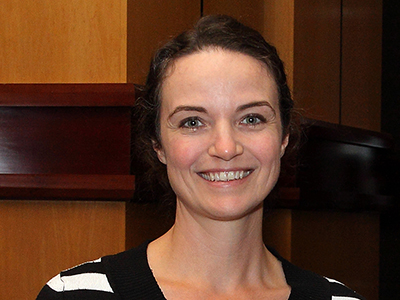 Division of Gastrointestinal Surgery Instructor Angela Carter, Ph.D., was awarded a pilot grant from the Center for Addiction and Pain Prevention and Intervention (CAPPI).
Division of Gastrointestinal Surgery Instructor Angela Carter, Ph.D., was awarded a pilot grant from the Center for Addiction and Pain Prevention and Intervention (CAPPI).
CAPPI serves as a catalyst for novel and innovative research, training, community outreach, and patient care. This center is a meeting place for scientists, trainees, physicians, and persons in the community interested in discovering effective treatments and alleviating the suffering caused by addiction and pain.
CAPPI will fund Carter’s project to study the disease of addiction, particularly addiction to psychostimulants, or amphetamines (AMPHs), like Adderall.
AMPHs are highly effective psychostimulants commonly used for the treatment of neuropsychiatric disorders such as attention deficit hyperactivity disorder. AMPHs are also commonly abused, leading to devastating medical and societal problems.
According to a study from Johns Hopkins University, between 2006-2011, nonmedical use of Adderall increased 67 percent and hospital emergency room visits increased 156 percent. In 2017, AMPHs were the drugs most frequently involved in deaths in four regions that include 19 states west of the Mississippi (geographic breakdown of deaths by drug; C.D.C. 2019.)
Recent studies suggest that imbalances in the gut microbiome (dysbiosis) play a role in fueling drug abuse. Microbial products such as short-chain fatty acids are suspected to play a fundamental role in this process.
Carter’s project will investigate the molecular mechanisms by which the microbiome alters AMPH-induced responses, focusing on regulation of central dopamine neurotransmission and reward processes.
In the future, her team will use the discoveries generated in this project, funded by CAPPI, as preliminary data for an NIH R01 application.
“The goal of this work is to uncover new potential therapeutic targets for the treatment of psychostimulant abuse,” said Carter. “Microbes are powerful symbionts that play a huge role in many aspects of healthy physiology, and consequently, dysbiosis is involved in many diseases. We are excited to investigate the role of the microbiome in brain signaling and to apply this knowledge to pathologies such as addiction.”